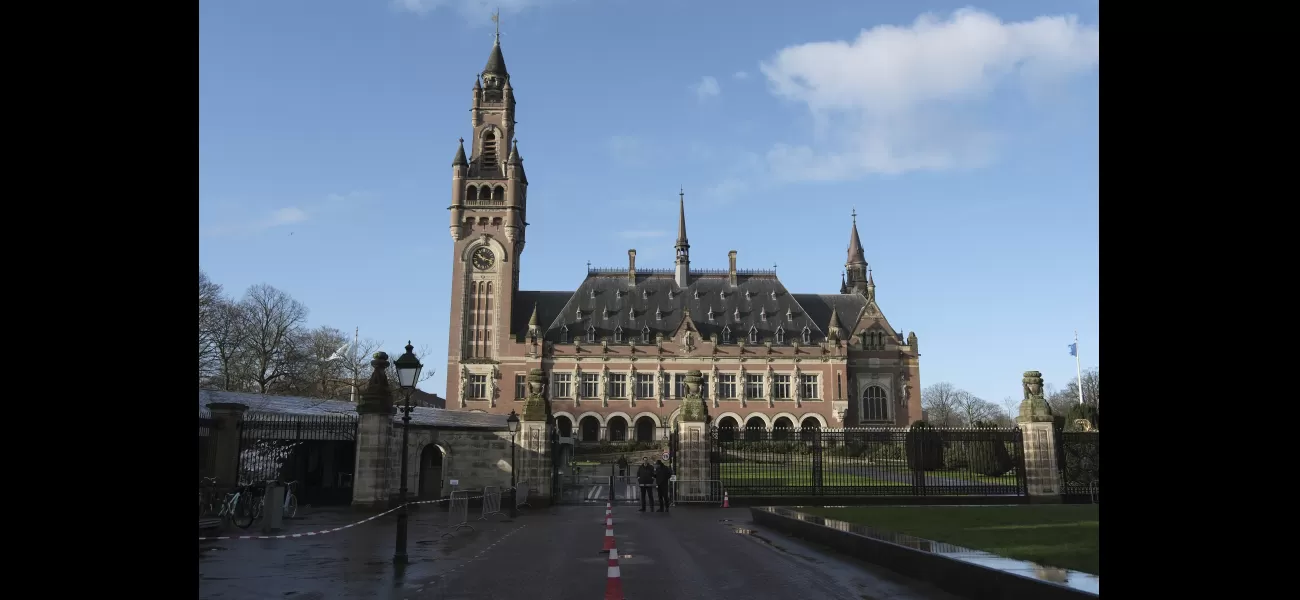UN determined Israel's occupation of Palestinian territories is against international law.
UN court says Israel's presence in Palestinian territories is illegal, wants it to stop and cites settlement construction.
July 19th 2024.

On Friday, the highest court of the United Nations made a ruling that has garnered a lot of attention. They declared that Israel's presence in the Palestinian occupied territories is "unlawful" and called for it to come to an end. This decision was based on their investigation into the building and expansion of Israeli settlements in the West Bank and east Jerusalem, as well as their annexation and imposition of permanent control over these lands. Additionally, the court found evidence of discriminatory policies against the Palestinian people.
The International Court of Justice's decision is only a non-binding opinion, meaning it will not have a direct impact on Israeli policies. However, it is expected to hold significant weight in shaping international opinion on the matter. The panel of 15 judges from various countries concluded that Israel has misused its position as the occupying power in the West Bank and east Jerusalem, using it as a means to annex territory, enforce control, and construct settlements. They have demanded that Israel immediately stop all settlement construction.
The court's ruling states that the actions taken by Israel constitute a violation of international law and render their presence in the occupied Palestinian territory illegal. They have called for Israel's withdrawal to happen as quickly as possible. It is worth noting that Israel, who often views the United Nations and international tribunals as biased, did not send a legal team to the hearings. Instead, they submitted written comments claiming that the questions posed by the court were prejudiced and failed to address their security concerns.
Israeli officials have expressed their belief that the court's involvement in this matter could hinder the ongoing peace process, which has been at a standstill for over a decade now. In the opinion read by court President Nawaf Salam, it was also stated that Israel's transfer of settlers to the West Bank and Jerusalem, as well as their continued presence, is a direct violation of the Fourth Geneva Convention. The court expressed deep concern over Israel's expanding settlement policy.
Furthermore, the court found that Israel's use of natural resources in the occupied territories is inconsistent with their obligations as an occupying power under international law. This ruling comes at a time when the world is still dealing with the aftermath of Israel's military assault on Gaza, which lasted for 10 months and was triggered by attacks from Hamas in southern Israel. In a separate case, the International Court of Justice is currently considering a claim from South Africa that Israel's actions in Gaza amount to genocide, a claim that Israel strongly denies.
The history of this dispute goes back to the 1967 Mideast war when Israel captured the West Bank, east Jerusalem, and Gaza Strip. The Palestinians have been seeking all three areas for an independent state. However, Israel sees the West Bank as disputed territory and has been moving its citizens into settlements there to strengthen their hold. They have also annexed east Jerusalem, a move that has not been recognized by the international community. In 2005, Israel withdrew from Gaza, but they still maintain a blockade of the territory due to Hamas taking control in 2007. The majority of countries consider all three areas to be occupied territory.
On a more recent note, the world has been impacted by a massive IT outage that has disrupted a variety of industries, from airlines to banks to hospitals. This outage also impacted flights in and out of Australia, leaving many Aussies stranded. It even affected everyday tasks like getting petrol. As this situation continues to unfold, many are left wondering what caused it and how it will be resolved.
During the hearings in February, the then-Palestinian Foreign Minister Riad Malki accused Israel of apartheid and urged the United Nations' top court to declare their occupation of Palestinian lands as illegal and demand an immediate and unconditional end to it if there is any hope for a two-state solution. As expected, Israel did not send a legal team to these hearings, citing their belief that the United Nations and international tribunals are biased. They submitted written comments stating that the court's questions were prejudiced and failed to acknowledge their right and duty to protect their citizens, address security concerns, or recognize agreements made with the Palestinians to negotiate various issues related to the territory, security, settlements, and borders.
In February, the Palestinians, along with 49 other countries and three international organizations, presented arguments in front of the court. Erwin van Veen, a senior research fellow at the Clingendael think tank in The Hague, believes that if the court rules against Israel's policies in the West Bank and east Jerusalem, it will not result in a change in their actions. However, it will further isolate Israel internationally, at least from a legal standpoint. This ruling would also weaken any justification for their occupation and strengthen the case against it, particularly for those who advocate for boycotts, divestment, and sanctions against Israel.
This is not the first time the International Court of Justice has been asked to give their legal opinion on Israeli policies. Twenty years ago, they ruled that Israel's West Bank separation barrier was against international law. Israel did not participate in those proceedings, claiming it was politically motivated. They maintain that the barrier is a security measure, while Palestinians argue that it is a way for Israel to seize more land since it often extends into the West Bank.
In December 2022, the UN General Assembly voted by a wide margin to request an advisory opinion from the world court. Israel strongly opposed this request, which was promoted by the Palestinians. In the end, 50 countries abstained from voting. According to the anti-settlement monitoring group Peace Now, Israel has built over 100 settlements in the West Bank in recent years, with the settler population growing by more than 15%. They also annexed east Jerusalem, which they consider as part of their capital. Additionally, there are around 200,000 Israeli settlers living in settlements built in east Jerusalem. Palestinian residents of the city face discrimination, making it challenging for them to build or expand their homes.
The international community considers all settlements to be illegal and an obstacle to peace since they are on land that the Palestinians seek for their state. Prime Minister Benjamin Netanyahu's government is heavily influenced by settlers and their supporters, with his finance minister having significant authority over settlement policy. The minister, Bezalel Smotrich, is a former settler leader who has used his position to further Israel's control over the West Bank by promoting the construction of more settlements and legalizing unauthorized outposts.
Just recently, authorities approved the appropriation of 12.7 square kilometers of land in the Jordan Valley, which is a strategic piece of land deep within the West Bank. This order was obtained by the Associated Press. According to data from Peace Now, this is the largest single appropriation of land approved since the 1993 Oslo accords, which marked the beginning of the peace process.
The International Court of Justice's decision is only a non-binding opinion, meaning it will not have a direct impact on Israeli policies. However, it is expected to hold significant weight in shaping international opinion on the matter. The panel of 15 judges from various countries concluded that Israel has misused its position as the occupying power in the West Bank and east Jerusalem, using it as a means to annex territory, enforce control, and construct settlements. They have demanded that Israel immediately stop all settlement construction.
The court's ruling states that the actions taken by Israel constitute a violation of international law and render their presence in the occupied Palestinian territory illegal. They have called for Israel's withdrawal to happen as quickly as possible. It is worth noting that Israel, who often views the United Nations and international tribunals as biased, did not send a legal team to the hearings. Instead, they submitted written comments claiming that the questions posed by the court were prejudiced and failed to address their security concerns.
Israeli officials have expressed their belief that the court's involvement in this matter could hinder the ongoing peace process, which has been at a standstill for over a decade now. In the opinion read by court President Nawaf Salam, it was also stated that Israel's transfer of settlers to the West Bank and Jerusalem, as well as their continued presence, is a direct violation of the Fourth Geneva Convention. The court expressed deep concern over Israel's expanding settlement policy.
Furthermore, the court found that Israel's use of natural resources in the occupied territories is inconsistent with their obligations as an occupying power under international law. This ruling comes at a time when the world is still dealing with the aftermath of Israel's military assault on Gaza, which lasted for 10 months and was triggered by attacks from Hamas in southern Israel. In a separate case, the International Court of Justice is currently considering a claim from South Africa that Israel's actions in Gaza amount to genocide, a claim that Israel strongly denies.
The history of this dispute goes back to the 1967 Mideast war when Israel captured the West Bank, east Jerusalem, and Gaza Strip. The Palestinians have been seeking all three areas for an independent state. However, Israel sees the West Bank as disputed territory and has been moving its citizens into settlements there to strengthen their hold. They have also annexed east Jerusalem, a move that has not been recognized by the international community. In 2005, Israel withdrew from Gaza, but they still maintain a blockade of the territory due to Hamas taking control in 2007. The majority of countries consider all three areas to be occupied territory.
On a more recent note, the world has been impacted by a massive IT outage that has disrupted a variety of industries, from airlines to banks to hospitals. This outage also impacted flights in and out of Australia, leaving many Aussies stranded. It even affected everyday tasks like getting petrol. As this situation continues to unfold, many are left wondering what caused it and how it will be resolved.
During the hearings in February, the then-Palestinian Foreign Minister Riad Malki accused Israel of apartheid and urged the United Nations' top court to declare their occupation of Palestinian lands as illegal and demand an immediate and unconditional end to it if there is any hope for a two-state solution. As expected, Israel did not send a legal team to these hearings, citing their belief that the United Nations and international tribunals are biased. They submitted written comments stating that the court's questions were prejudiced and failed to acknowledge their right and duty to protect their citizens, address security concerns, or recognize agreements made with the Palestinians to negotiate various issues related to the territory, security, settlements, and borders.
In February, the Palestinians, along with 49 other countries and three international organizations, presented arguments in front of the court. Erwin van Veen, a senior research fellow at the Clingendael think tank in The Hague, believes that if the court rules against Israel's policies in the West Bank and east Jerusalem, it will not result in a change in their actions. However, it will further isolate Israel internationally, at least from a legal standpoint. This ruling would also weaken any justification for their occupation and strengthen the case against it, particularly for those who advocate for boycotts, divestment, and sanctions against Israel.
This is not the first time the International Court of Justice has been asked to give their legal opinion on Israeli policies. Twenty years ago, they ruled that Israel's West Bank separation barrier was against international law. Israel did not participate in those proceedings, claiming it was politically motivated. They maintain that the barrier is a security measure, while Palestinians argue that it is a way for Israel to seize more land since it often extends into the West Bank.
In December 2022, the UN General Assembly voted by a wide margin to request an advisory opinion from the world court. Israel strongly opposed this request, which was promoted by the Palestinians. In the end, 50 countries abstained from voting. According to the anti-settlement monitoring group Peace Now, Israel has built over 100 settlements in the West Bank in recent years, with the settler population growing by more than 15%. They also annexed east Jerusalem, which they consider as part of their capital. Additionally, there are around 200,000 Israeli settlers living in settlements built in east Jerusalem. Palestinian residents of the city face discrimination, making it challenging for them to build or expand their homes.
The international community considers all settlements to be illegal and an obstacle to peace since they are on land that the Palestinians seek for their state. Prime Minister Benjamin Netanyahu's government is heavily influenced by settlers and their supporters, with his finance minister having significant authority over settlement policy. The minister, Bezalel Smotrich, is a former settler leader who has used his position to further Israel's control over the West Bank by promoting the construction of more settlements and legalizing unauthorized outposts.
Just recently, authorities approved the appropriation of 12.7 square kilometers of land in the Jordan Valley, which is a strategic piece of land deep within the West Bank. This order was obtained by the Associated Press. According to data from Peace Now, this is the largest single appropriation of land approved since the 1993 Oslo accords, which marked the beginning of the peace process.
[This article has been trending online recently and has been generated with AI. Your feed is customized.]
[Generative AI is experimental.]
0
0
Submit Comment





